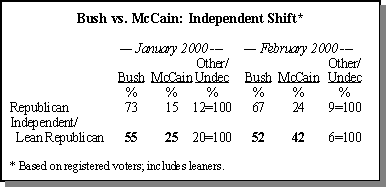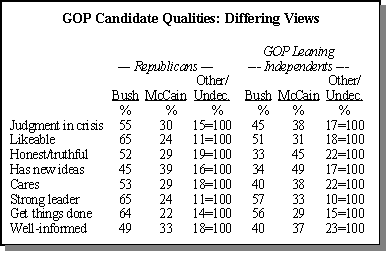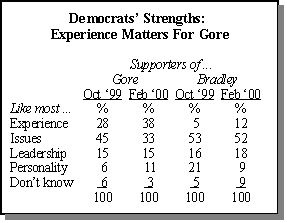Introduction and Summary

The outcome of the New Hampshire primary has changed candidate support patterns that last year seemed all but cast in stone. Al Gore has drawn into a statistical dead-heat with George W. Bush in a general-election ballot test, largely because core Democrats are rallying behind the vice president. At the same time, John McCain, who still trails Bush in the GOP primary contest, now looks like the stronger Republican candidate in November. The Arizona senator and former Vietnam POW not only appeals to such traditional GOP constituencies as white males and affluent voters, but he attracts support from two groups whose allegiances have swung back and forth in recent elections — political independents and older Americans. McCain is particularly appealing to draft-era men who would support him by a two-to-one margin over Gore.
McCain leads Gore, 49% to 41%, in the latest nationwide survey by the Pew Research Center, conducted Feb. 9-14 among 1,330 adults. By contrast, his GOP rival Bush is only able to achieve a statistical tie with the vice president (46%-45%, respectively). However, the survey finds major gender and generational differences in these test races. Voters over age 50 prefer McCain to Gore. But if the race is between Bush and Gore, the vice president does better with older voters, especially women.
Among younger people, the patterns are different. Voters under age 50 prefer Bush to Gore, although men support Bush by a much wider margin than women. But there is a gender gap in McCain’s support among those under 50: He easily wins the support of men (56%-33%), but loses the backing of women to Gore by a similar margin (39%-53%).
When matched against Gore, McCain leads among Independents 52%-34%. Bush holds a more modest 45%-40% lead over the vice president among these key voters. Independent men are particularly drawn to McCain, backing him by a nearly two-to-one margin over Gore. And Sen. McCain wins more support than Gov. Bush from voters who are critical of the GOP congressional leaders (35% to 26%).

Since the end of last year, Gore has dramatically improved his standing in the head-to-head contest against Bush, whom he trailed by 15 percentage points. Since December, Gore has boosted his support from Democrats (by 10 points) and such key Democratic groups as non-whites (8 points) and women over age 50 (13 points). He also made gains among Southerners (11 points) and those making over $75,000 a year (11 points). And the vice president draws strong backing from unmarried women, who are among his strongest supporters. Gore leads Bush among this group, 57%-36%.
Bush Still GOP Front-Runner
Despite McCain’s surprisingly easy win in New Hampshire, he trails Bush nationwide for the Republican Party nomination by 62% to 30% among registered GOP partisans and Republican-leaning Independents. Still, McCain has trimmed Bush’s lead, which stood at 69% to 17% in January. Bush owes his continued front-runner status to the strong backing of Republicans, who support him 67% to 24%. He does not fare as well among Republican-leaning Independents, who favor Bush by a much narrower 52% to 42%. McCain’s greater strength in a general election match-up than in the primary race reflects his appeal among Independents.
While gender differences are playing a key role in presidential politics, they also are having an impact on the race for control of Congress. Democrats hold a slight 47%-44% lead in this contest, down from the 49%-43% advantage they held in October. Democrats hold a lopsided 17 point edge among women in the congressional preference question, while Republicans have a 14 point lead among men.
It is doubtful that the budget debate on Capitol Hill is having much impact on congressional voting intentions, as only 29% of Americans even know the government is running a budget surplus. Public sentiment on how to use the surplus has not changed markedly over the past year. A plurality of Americans (44%) favor using the surplus to secure Medicare and Social Security, while 24% support increased spending on education, the environment and other domestic programs. Only 12% favor tapping the surplus to finance tax cuts.
Americans are paying closer attention to the presidential campaign, but they were less focused on the New Hampshire primaries. Fully one-quarter (26%) of the public now says it is paying close attention to the campaign, up from 19% last month. But only 18% paid close attention to the New Hampshire primaries, and less than half could name the winners of those contests.
GOP Independents Boost McCain
While Bush maintains a solid lead in the race for the GOP nomination, McCain has made some inroads in recent weeks. He is now favored by 30% of registered Republicans and Independents who lean Republican, up from 17% last month.

McCain has made substantial gains among women, those over age 50, college graduates, Midwesterners, and Independents. He continues to draw more support from Independents who lean Republican than from Republican Party loyalists. McCain’s post-New Hampshire bounce among Independents has come less as a result of Independents moving away from Bush and more from their migration toward McCain as the GOP field has narrowed.
When asked what they like most about Bush, supporters say they are attracted to his stand on issues (40%) and his leadership ability (29%). Experience and personality are less important factors in support for Bush; 16% and 10%, respectively, mention these traits in describing what they like most about him.
McCain supporters overwhelmingly consider his stand on issues to be his greatest asset. Half of those who prefer McCain as their party’s nominee say his issue positions are what they like most about him. The senator’s leadership ability (17%), experience (16%) and personality (14%) are viewed as less important.
When supporters of McCain are asked what they like least about his main rival, a plurality cite Bush’s personality (34%). Roughly one-in-four (27%) say what they like least about Bush is his stand on issues, 14% point to his experience and 11% cite his leadership ability.
The factor that McCain supporters regard as his greatest strength — his position on issues — his opponents view as his greatest liability. Fully 38% of those Republicans or GOP Independents who don’t support McCain for the party’s nomination say his stand on issues is what they like least about him. One-in-five (23%) cite the senator’s personality; very few point to his experience (9%) or leadership ability (6%).
The Eye of the Beholder
In addition to these general impressions, respondents were asked to evaluate the candidates on a series of specific traits and qualities. Bush came out ahead in all but one of the eight categories listed. When paired against McCain, Bush is clearly seen as the candidate most able to get things done (61% vs. 24% for McCain). By a better than two-to-one margin, Republicans and Independents who lean to the GOP view Bush, rather than McCain, as a strong leader (62% vs. 27%) and personally likeable (61% vs. 26%).
Bush also enjoys a significant advantage on the questions of which candidate would use good judgment in a crisis (52% vs. 32%) and which one cares about ordinary people (50% vs. 31%). In addition, Bush leads McCain, though more narrowly, on being described as honest and truthful (45% vs. 34%) and well-informed (46% vs. 34%). The two candidates are tied on the issue of who has new ideas: 41% of Republicans say Bush is best described by this phrase; 42% say this phrase better describes McCain.

Just as Republican loyalists and GOP leaners differ in their candidate preferences, there are significant differences between these groups in their evaluations of the candidates’ qualities. GOP partisans see Bush as the more honest and truthful candidate (52% vs. 29% who say McCain). Republican-leaning Independents, on the other hand, give McCain an edge on this quality — 45% vs. 33% who choose Bush. Similarly, when asked which man has new ideas, party loyalists identify Bush (45% vs. 39% over McCain), while GOP Independents go with McCain (49% vs. 34% for Bush). Finally, Republicans are much more likely to see Bush as the candidate who cares about people like them (53% vs. 29% for McCain). GOP leaners divide evenly: 40% say Bush, 38% McCain.
Overall, voters’ evaluations of whether or not a candidate is a strong leader are important in deciding how they actually vote. This quality is more closely linked than any other to voting preferences. But for GOP Independents, perceptions of McCain as the candidate of new ideas is what most distinguishes him from Bush. These impressions about McCain are a leading factor in his support among Republican-leaning Independents.(1)
(1) Based on multivariate analysis of candidate qualities (Q.33) as predictors of support for Bush or McCain among Republicans and Republican-leaning Independents.)
Experience Now a Plus For Gore
The Democratic primary contest remains largely unchanged from last month. Gore maintains a commanding 65%-28% lead over Bill Bradley. Gore enjoys strong support from nearly all major demographic groups. His strongest supporters are women over the age of 50, non-whites and suburbanites. Bradley draws much of his support from white men, Independents, and those living in the West. However, even among these groups, no more than 40% support the former NBA star in the match-up with Gore.

Gore’s connection to Clinton has now become one of his greatest assets. When Democratic voters who support Gore for the party’s nomination were asked what they like most about the vice president, a plurality (38%) point to his experience. This represents a significant change from October 1999, when Gore supporters were placing far more emphasis on his issue positions; at the time, 45% cited this trait as what they liked most, while far fewer (28%) cited Gore’s experience. In this month’s survey, the number of Gore supporters who say issues are most important fell to 33%, while leadership ability (15%) and personality (11%) continue to rank as less important attributes.
Bradley’s greatest strength, in the eyes of his supporters, remains his stand on issues. More than half (52%) of those who prefer Bradley over Gore for the Democratic nomination say what they like most about the former New Jersey senator are his issue positions. Bradley’s supporters place far less emphasis on his leadership ability (18%), experience (12%) or personality (9%).
Gore opponents cite his personality (39%) and issue positions (31%) as the main reasons they don’t like the vice president. Most Bradley opponents identify his stand on issues (26%), as well as his personality (22%), as negatives.
Gore bests Bradley on all eight of the candidate qualities tested in the poll. His biggest advantages come on questions of which candidate is well-informed (62% Gore vs. 20% Bradley), which would use good judgment in a crisis (59% vs. 23%) and is able to get things done (61% vs. 23%). Wide gaps also exist on which candidate is perceived as a strong leader (58% Gore vs. 28% Bradley), as caring about people (55% vs. 26%) and is seen as personally likeable (52% vs. 33%). Gore leads Bradley by a narrower margin on the issue of which candidate is most honest and truthful: 48% associate this quality with the vice president, while 29% say it better describes Bradley. The only quality on which Bradley comes close to parity with Gore is on having new ideas — 47% say this best describes Gore, 39% choose Bradley.
Congressional Race Tight

The Democrats now hold a very slight lead in the race for control of Congress: 47% of registered voters say, if the election was held today, they would vote for the Democratic candidate from their district; 44% would vote for the Republican. Democrats held a slightly bigger lead in October (49%-43%). Among the Republican Party’s biggest supporters are men — particularly white men and those under 30 — white evangelical Protestants and high-income voters. Among the Democrats’ most solid backers are blacks, women under age 30 and low-income voters.
The gender gap on congressional preference has widened substantially in recent months. In October 1999, men narrowly preferred Republicans over Democrats (47%-45%) while women chose Democrats over Republicans by a margin of 54%-39%. This month, men are leaning much more heavily toward the GOP — 53% vs. 39%. Women’s preferences remain largely unchanged (37% Republican, 54% Democratic).